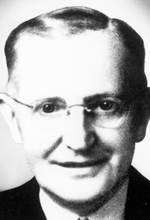1939: John T. 'Jack' Watson, P.Eng.

A native of Lanarkshire, Scotland, 'Jack' Watson began studying electrical and mechanical engineering in his early teens, taking night classes while working 10-hour days as a clerk. He came to Canada in 1902 and was hired as a machinist for the Canadian Pacific Railway in Calgary. After a brief period installing electrical transformers in Seattle, he returned to Calgary as an engineer for the city power plant. During this time he continued his studies and in 1907 received a first class engineer's certificate.
In 1916 Watson was hired by the City of Lethbridge as chief engineer at the city power plant. By the end of his first year as engineer, the plant had earned profits more than 10 times the total for the previous three years and by 1924 they had increased 30-fold. In 1927 Watson accepted a job with the East Kootenay Power Company as superintendent of its new power plant in Sentinel, Alta., but returned to Lethbridge a year later to occupy the newly created position of city manager, which he held until retiring in 1949.
While city manager, Watson received wide acclaim for re-allocating large profits earned by the electric and water utilities to help reduce tax rates substantially. Under his direction, Lethbridge was one of the few Canadian cities with sound finances during the Depression and the Second World War.
Watson was first elected to council of the Association of Professional Engineers of Alberta (APEA; now The Association of Professional Engineers, Geologists and Geophysicists of Alberta) in 1925 and served a total of seven years, including as association vice-president in 1938 and president the following year. He passed away in 1960.
